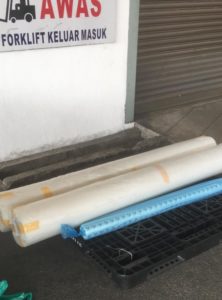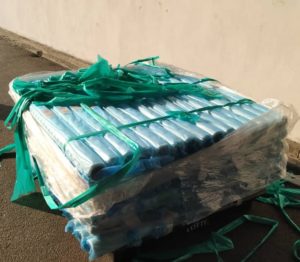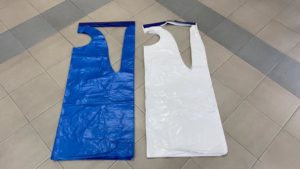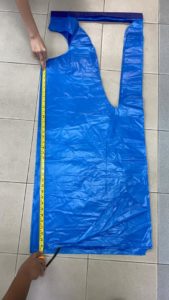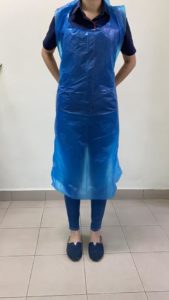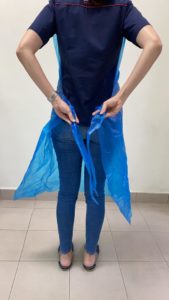MALAYSIAN PLASTICS MAKERS TO MAKE SWABS FOR COVID-19 MASS TESTING
PETALING JAYA, 20 May 2020: Specialised swab sticks made in Malaysia are heading for clinical trials and, if approved, will pave the way for COVID-19 mass testing which is crucial to the country‘s exit from lockdown.
A team of public health and medical experts from around Malaysia has been working with the Malaysian Plastics Manufacturers Association (MPMA) and the Malaysian Petrochemicals Association (MPA) to make the specialised nasopharyngeal and oropharyngeal swab sticks and contribute 1.2 million swabs for the COVID-19 tests.
“Pre-clinical testing suggests that the swabs we produced are performing well,” said Professor Dr Tan Maw Pin from Universiti Malaya’s Medical Faculty. “Malaysia has a highly successful plastics industry which has been able to manufacture the polyester fibres and the plastics shafts which make up the swab,” she said.
“We are currently working to expedite the process of obtaining the necessary funding and approvals for clinical trials, as well as an approval from the Medical Devices Authority (MDA) so that the swabs can go into production and distribution as soon as possible,” she said. The swabs produced will be used for diagnostic testing for flu and other virus illness in future and will continue to be useful even after the COVID-19 pandemic.
Professor Dr Tan is part of the team drawn from experts from Hospital Kuala Lumpur (HKL), Hospital Pulau Pinang, Perdana Universiti-Royal College of Surgeons (PU-RCSI) in Ireland, and Universiti Kebangsaan Malaysia (UKM) as well as Universiti Malaya’s (UM) Medical Faculty.
“The ability to conduct mass testing is critical to lifting the Movement Control Order (MCO), and nose swabs are critical to mass testing,” she added. “Buying the millions of nose swabs needed from overseas is probably not feasible at this time,” said Professor Dr Tan.
Malaysia currently does not have any facilities to make these swabs, which are expected to be in short supply world-wide, said MPMA President Datuk Lim Kok Boon. “Malaysia needs to be self-sufficient in producing these specialised swabs which are in high demand around the world now,” he said.
The US, where Malaysia’s main suppliers are, has banned the export of medical goods which includes these swabs. Alternative suppliers are in Italy and are also struggling to keep up with demand. China makes these swabs but there are hurdles in securing supply amid high demand and in importing and transporting the swabs.
This initiative is in partnership with the Ministry of International Trade and Industry (MITI) which has allowed resumption of operations to manufacturers of essential plastics products since the beginning of the Movement Control Order on 18 March 2020.
The team of experts was able to identify and contact local factories which agreed to repurpose their production lines to make the different components for the swabs.
“Our members worked very quickly and very hard to resolve and overcome technical obstacles to be able to make the swab material using high quality polyester fibers,” said Lim Kok Boon.
“Malaysia is home to some of the biggest resin producers in South-east Asia and we are confident that we have the capacity to scale up and sustain this initiative for the long run,” said President of MPA, Akbar Mohd Thayoob (from Petronas Chemical Group Bhd).
The swab sticks must be made from synthetic material such as polyester fibers and plastics shafts as natural materials such as wood, cotton and paper contain DNA which would interfere with the tests. Also, the swab sticks have to be flexible enough to insert into the nose cavity.
Precision shafts for the swabs will be produced by Heveaplast (M) Sdn Bhd, a precision plastics extrusion manufacturer which will be contributing by producing the 1.2 million swabs. For this purpose, Heveaplast has modified its plastics extrusion process leveraging on its latest extrusion machine’s optical measurement feature. The shafts are made of polypropylene, which are being sponsored by Lotte Chemical Titan (M) Sdn Bhd, Malaysia’s first and leading producer of olefins and polyolefins.
Silicon Creation Sdn Bhd has undertaken to wind the swabs onto the tips of the shafts, with the swabbing material of polyester staple fiber sponsored by Recron Malaysia Sdn Bhd. Recron Malaysia is an integrated polyester and textile producer with manufacturing facilities in Melaka and Nilai, Negeri Sembilan.
Photo 1 – Heveaplast’s plastics extrusion line to produce precision shafts for swab sticks
Photo 2 – Swab sticks production process at Heveaplast
Photo 3 & 4 – Samples of swab sticks produced by MPMA
PLASTICS MAKERS GIVE CRITICAL DISPOSABLES TO HOSPITALS AMID SHORTAGE OF PPES

KUALA LUMPUR, 23 March 2020: PLASTICS manufacturers are stepping up to donate and supply hospitals and their frontliners with plastic items to respond to the shortage of personal protective equipment (PPE) due to the widespread Covid-19 outbreak.
The Malaysian Plastics Manufacturers Association (MPMA) has organised a donation drive among its members, calling on them to give what they can to hospitals facing shortages of disposables, including mineral water, face shields, aprons, gowns, shoe or ankle covers, bottles and goggles.
MPMA members have already donated 15,000 plastic aprons for doctors, nurses and hospital staff to use and will be donating more in days to come.
“We are looking at sourcing longer plastic aprons that are better-suited for medical frontliners. In the meantime, our members are providing plastic sheeting for the frontliners to repurpose as they need,” said Datuk Lim Kok Boon, MPMA’s president.
The donated plastic sheeting can be used as temporary barriers or curtains in the hospitals, as well as disposable protective covering for medical staff.
“As plastics is a critical sector, we are determined to do whatever we can to help the nation’s fight against the Covid-19 outbreak,” Lim said. “We must protect the frontliners in our battle against this disease.”
PROTASCO POSTS FULL YEAR TURNAROUND ON RIGHT-SIZING EXERCISE
KAJANG, 27 February 2020: Protasco Berhad recorded a fourth straight quarter of profit and returned to the black with a full-year net profit of RM19.1 million despite a lower revenue for the financial year ended 31 December 2019.
The Maintenance, Construction, Property, Trading and Education business segments recorded improvement in its financial performance and contributed to the full-year Group pre-tax profit of RM34.6 million in 2019 against a pre-tax loss of RM23.9 million in the previous financial year. This favourable result was achieved despite lower revenue of RM823.6 million in the current financial year as compared to RM904.9 million in the previous financial year.
Profit after tax for the quarter is RM5.9 million as compared to a loss after tax of RM42.1 million recorded in the preceding corresponding quarter.
The Group’s current quarter and full-year favourable financial performance revealed the continuing positive impact of its right-sizing exercise which includes cost optimisation efforts that generated better margins.
“This turnaround is proof that our hard work is paying off and we hope to carry this positive momentum for the long term. We want to capitalise on our fundamentals and ensure a sustainable footing for the long run, so that we could give our best to our stakeholders,” said Dato’ Ir Kenny Chong Ther Nen, Protasco’s newly appointed Group Managing Director.
Protasco’s revenue for the fourth quarter, however, slid by 10 percent to RM242.2 million resulting in a lower full-year revenue of RM823.6 million as compared to RM904.9 million in the previous financial year due to lower contributions received from the Perumahan Penjawat Awam (“PPA”) Phase 2 Project under its Construction business segment which is expected to be completed by early second quarter 2020.
The construction of its solar plant in Melaka has commenced and is expected to be completed in the fourth quarter of 2020. Upon completion, it will immediately begin commissioning electricity to Tenaga National Berhad (“TNB”). It is expected to contribute positively to the Group’s earnings. Protasco through its subsidiary I2 Solarpark One Sdn Bhd has a 21-year power purchase agreement with TNB.
BETTER MARGINS PUSH DAMANSARA REALTY’S 2019 PROFIT HIGHER BY 19.3 PERCENT
BETTER MARGINS PUSH DAMANSARA REALTY’S 2019 PROFIT HIGHER BY 19.3 PERCENT
KUALA LUMPUR, 19 February 2020 – Damansara Realty Berhad (DBhd) saw its 2019 full year net profit jump 19.3 percent to RM23.3 million and its pre-tax profit rise 7.6 percent to RM27.3 million.
The Group’s improved performance resulted from higher Integrated Facilities Management (IFM) projects margin, sales of its Aliff Square 2 (AS2) commercial units as well as contributions from its joint venture with Country Garden for Central Park development in Johor Bahru.
“This performance is evidence that DBhd is progressing towards high-growth & better-margin projects despite lower revenue recorded last year,” said DBhd’s Group Managing Director, Ts. Brian Iskandar Zulkarim.”
DBhd Group fourth quarter revenue has increased by 7.2 percent to RM88.2 million compared to the same quarter in the preceding year. Net profit stood at RM13.5 million and pre-tax profit at RM14.8 million.
“We are seeing positive results from our strategic alliances, especially for our property development segment.” We have also continued to expand these alliances from our partnership with Active Estates for the development of 68 Commercial Units at Business Boulevard Central Park JB worth more than RM156 million,” he added.
DBhd also partnered with Menteri Besar Negeri Sembilan Incorporated (MBNSI) to jointly develop a mixed-development project Bandar Sri Sendayan, Negeri Sembilan worth more than RM770 million. With planning underway, DBhd is looking to break ground within the Q2 of 2020. This 50-acre commercial plot is to be developed over the next 5 to 10 years.
“In 2020, we are doubling our efforts to explore more opportunities in the IFM segment. We believe that our strategy in improving the quality of our contracts through technology adaptation and innovation will bear fruits soon,” Ts. Brian said.
“This includes the Metro Parking Group (MPG) implementing its in-house cashless and automated system to improve long-term business efficiency and margins.”
Earlier in 2019, the MPG through its subsidiary, Metro Parking Philippines (MPP) was awarded a RM62 million contract to develop and manage various parking facilities in Madrigal Business District, Manila.
The Singapore Operations via Metro Parking Singapore (MPS) also reported a positive result in 2019 following a major transformation exercise aimed at bringing it back to profitability, led by its newly appointed Managing Director, Mohd Afiq Farhan Bin Md Hanif, who is one of the talents in the Group’s succession planning programme.
*Ts. stands for the title of ‘Professional Technologist’ awarded by the Malaysia Board of Technologists (MBOT).
MALAYSIANS NEED CASH INJECTIONS NOW TO SURVIVE COVID-19 ECONOMIC DISASTER

MALAYSIANS NEED CASH INJECTIONS NOW TO SURVIVE COVID-19 ECONOMIC DISASTER
COMMENTARY, March 20 — The government needs to put cold hard cash into the rakyat’s hands today. Right now.
Freezing the monthly tax deductions (PCB) is a start, followed by freezing the CP204 advance tax paid by businesses. Next, the government should reverse all the PCB and CP204 paid for the last 12 months.
This is a measure that is easily within the government’s ability. There’s no need for people to apply for anything, qualify for anything, to find the right form. Just press the button, and send that money back to where it came from in this dire time of need.
Reversing PCB directly to the employees will put money in their pockets, to use on their children, on sick parents, on paying for necessities for the next few months. Reversing the CP204 will allow businesses to keep paying wages and salaries, to pay suppliers so that they in turn can pay their wages and salaries and pay their suppliers.
This is one way of cutting the impact of a cash crunch. The first stimulus package of RM20 billion was probably adequate at the time then-prime minister Tun Dr Mahathir Mohamad announced it.
The recent addition of another few billion ringgit announced by Prime Minister Tan Sri Muhyiddin Yassin will not really make a difference. The lockdown has changed everything.
The most immediate measures that will bring relief is to stop sucking cash out of the economy and out of businesses’ accounts. This cash should stay in the economy and be used to keep people alive. Don’t let “experts” tell you anything different.
Without a cash injection, there will be widespread failure of businesses. Many small businesses will fail, and with them that part of the economy that they keep alive — small hawkers who pay dishwashers a daily wage, small firms who pay dispatch riders and cleaners and newspaper delivery men.
If anything, the government should consider giving an immediate increase in salary to the people on the front lines, especially those on the lower pay rungs. All the emergency personnel — police, Bomba, paramedics, nurses, orderlies, hospital staff and assistants — they should be paid more.
Do not talk about raising government revenue, do not talk about 1MDB bonds, do not talk about deficits. Talk about reassuring people that you know what you’re doing, and you know what the economy needs and immediate cash injection.
Do not talk about whether the government can afford it. To quote Nobel Laureate Joseph Stiglitz, the American economist: “When the US was attacked during the Second World War, no one asked, ‘Can we afford to fight the war?’ It was an existential matter. We could not afford not to fight it.”
What is the government for if not for this, to help us shoulder the burden of tough times? Why do we pay taxes if not to have a leader who will pull us all together and bring us through the coming adversity.
* Lee Siew Lian is a small business owner who also reads Malay Mail.
Link to article:
https://www.malaymail.com/news/malaysia/2020/03/20/malaysians-need-cash-injections-now-to-survive-covid-19-economic-disaster/1848361
LIM KIT SIANG: TELL MALAYSIANS ABOUT THE WORST-CASE SCENARIO ABOUT THE COVID-19 CRISIS
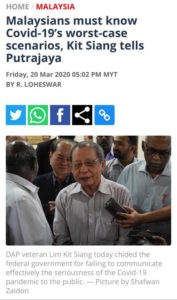 Media Statement by DAP MP for Iskandar Puteri Lim Kit Siang on Friday, 20th March 2020 that mentions our Director Lee Siew Lian (head towards the end of the article to spot it.)
Media Statement by DAP MP for Iskandar Puteri Lim Kit Siang on Friday, 20th March 2020 that mentions our Director Lee Siew Lian (head towards the end of the article to spot it.)
TELL MALAYSIANS THE WORST-CASE SCENARIO ABOUT THE COVID-19 CRISIS
Global news about the Covid-19 pandemic continues to be bleak and ominous.
Italy passed a grim milestone yesterday when its deaths linked to the virus soared to 3,405, exceeding the toll of 3,248 deaths in China, where the virus first broke out.
Cemeteries in the northern city of Bergamo were so overwhelmed that troops were called in to transport bodies elsewhere to be cremated. The army sent 120 doctors and health professionals to help in Bergamo and nearby Lodi, while field hospitals and emergency respiratory units were being set up elsewhere in the north.
The spread of the virus in Italy had been swift and terrifying, even after the country imposed strict limits on people’s movements. As the death toll rose, traditional funeral services were outlawed as part of the national restrictions against gatherings.
The country tallied 902 deaths in the last two days alone: 475 Wednesday and 427 on Thursday. Most who died had serious pre-existing conditions. Italy now has 41,035 coronavirus cases.
In the United States, the Governor of California, Gavin Newsom ordered California’s almost 40 million residents to stay home except for essential trips, after 1,040 cases of the coronavirus had been identified and 19 people had died.
Newsom earlier said the state was projecting that 56 percent of California’s population would be infected with the virus over an eight-week period — a stunning disclosure that rippled through headlines as it would work out to 22.4 million cases. But Newsom later said he hoped that the extraordinary measures he proposed in California would stop those projections from coming to pass.
Even London is considering a lockdown over the Covid-19 pandemic, as United Kingdom joins ten countries with the most number of Covid-19 deaths with a global death toll of 10,028 – Italy (3405), China (3,248), Iran (1,284), Spain (831), France (372), United States (200), United Kingdom (144), South Korea (94), Netherlands (76) and Germany (44).
At least, 245,049 people have been infected globally, with seven countries having exceeded 10,000 cases – China (80,967), Italy (41,035), Iran (18,407), Spain (18,077), Germany (15,320), United States (13,800) and France (10,995).
When the Prime Minister, Tan Sri Muhyiddin Yassin announced the Movement Control Order (MCO) on Monday night, he failed to explain the seriousness of the epidemic and importance to break the chain of infection of the Covid-19 virus. Even his second live telecast two days later was not a full success either.
The nation is at war with the Covid-19 virus and the Government must communicate fully and effectively to all Malaysians – including sharing with all Malaysians the worst-case scenarios about the Covid-19 crisis.
It is important that the Prime Minister and all Ministers earn the trust and confidence of all Malaysians that they are capable and competent to wage and win this war and this is why good suggestions should be deliberated and acted upon without delay by the government.
Many good and constructive suggestions as to how to fight and win this war have been made today itself, like the following:
1. Proposal by former women, family and community development minister Dr Wan Azizah Wan Ismail and her former deputy Hannah Yeoh that the government provide additional allocation for frontliners who are risking their lives in the battle against Covid-19; and
2. Ideas by small business owner Lee Siew Lian in an article today in the Malay Mail online entitled “Malaysians need cash injections now to survive Covid-19 economic disaster”, in particular her proposal to the Minister of Finance to reverse all the PCB and CP204 paid for the last 12 months.
Lim Kit Siang
EKONOMI MALAYSIA PERLU SUNTIKAN TUNAI SEGERA UNTUK IMBANG KESAN BURUK COVID-19
KOMENTAR, 20 Mac — Kerajaan perlu memberikan wang tunai kepada rakyat segera, kalau boleh sekarang juga.
Tindakan pertama yang kerajaan perlu ambil adalah membekukan Potongan Cukai Bulanan (PCB) daripada gaji dan juga bayaran CP204, iaitu cukai terdahulu yang dibayar oleh perniagaan. Selanjutnya, kerajaan memulangkan semula potongan PCB and bayaran CP204 sepanjang 12 bulan yang lepas.
Ini boleh dilaksanakan serta-merta kerana ia berada dalam kemampuan kerajaan. Tidak perlu isi borang atau penuhi sebarang syarat. Hanya tekan butang dan kembalikan tunai kepada semua orang yang telah dikenakan potongan itu, terutamanya kepada golongan yang memerlukannya sekarang.
Mengembalikan semula potongan cukai dengan memasukkan terus ke dalam akaun bank golongan pekerja akan membolehkan mereka menanggung keperluan anak serta ibu bapa yang uzur, dan membeli keperluan harian.
Mengembalikan potongan CP204 pula akan membolehkan peniaga membayar gaji harian dan bulanan pekerja mereka, dan membayar pembekal supaya pembekal itu pula boleh membayar gaji harian dan bulanan pekerja mereka serta pembekal mereka.
Inil adalah satu cara untuk mengelakkan kesan “cash crunch” (keruntuhan tunai) yang bakal berlaku nanti. Pakej stimulus pertama RM20 bilion yang diumumkan oleh bekas Perdana Menteri Tun Dr Mahathir Mohamad memang memadai jika tiada krisis wabak ini.
Sebaliknya, pakej stimulus kedua bernilai beberapa bilion ringgit yang diumumkan oleh Perdana Menteri Tan Sri Muhyiddin Yassin memang tidak mencukupi. Ini adalah kerana Perintah Kawalan Pergerakan kerajaan untuk dua minggu ini telah mengubah segala-galanya.
Yang paling penting buat masa ini adalah untuk kerajaan tidak menarik keluar wang daripada ekonomi dan daripada poket peniaga. Wang tunai ini perlu kekal dalam ekonomi dan digunakan untuk memastikan survival rakyat. Jangan mudah meneirma nasihat orang yang mengaku “pakar” yang menolak tindakan ini kononnya kerana takut dengan hutang negara.
Tanpa suntikan tunai, ekonomi negara akan menyaksikan kemuflisan dan keruntuhan sektor perniagaan. Ramai peniaga kecil akan gulung tikar dan golongan yang bergantung kepada mereka akan terjejas teruk – seperti penjaja yang menggajikan pencuci pinggan, dan perniagaan kecil yang membayar abang dispatch, kakak pencuci dan uncle suratkhabar.
Selain itu, kerajaan patut menaikkan gaji petugas barisan hadapan, terutamanya mereka yang berpendapatan rendah. Pekerja dan petugas barisan hadapan perlu dibayar lebih — polis, bomba, paramedik, jururawat, pembantu hospital.
Ini bukan masanya untuk bercakap tentang sumber pendapatan kerajaan, bon 1MDB, defisit belanjawan kerajaan. Yang patut kerajaan lakukan sekarang ialah menyakinkan rakyat bahawa anda tahu apa yang anda laksanakan demi rakyat. Dan tunjukkan bahawa anda tahu apa yang ekonomi perlukan, iaitu suntikan tunai segera.
Jangan risau sama ada kerajaan mampu atau tidak. Kerajaan perlu tegas dan memahami kata-kata Penerima Hadiah Nobel dan pakar ekonomi Joseph Stiglitz: “Apabila Amerika Syarikat diserang dalam Perang Dunia Kedua, tiada siapa yang bertanya ‘mampukah kita berperang?’ Ini soal hidup mati kita. Kita tiada pilihan, kita terpaksa berjuang dalam peperangan itu.”
Apakah peranan sebenar kerajaan jika bukan untuk berkhidmat demi rakyat, terutama dalam masa yang amat genting ini? Apa guna rakyat dan peniaga membayar cukai jika pemimpin takut untuk bergerak dan berjuang demi kebajikan, keselamatan dan kepentingan rakyat.
Memang kita penting kita jaga kita tetapi kerajaan harus memainkan peranan utama untuk menjaga kita semua.
* Lee Siew Lian adalah seorang usahawan komunikasi yang turut membaca Malay Mail.
DAMANSARA REALTY UNVEILS BUSINESS BOULEVARD @ CENTRAL PARK
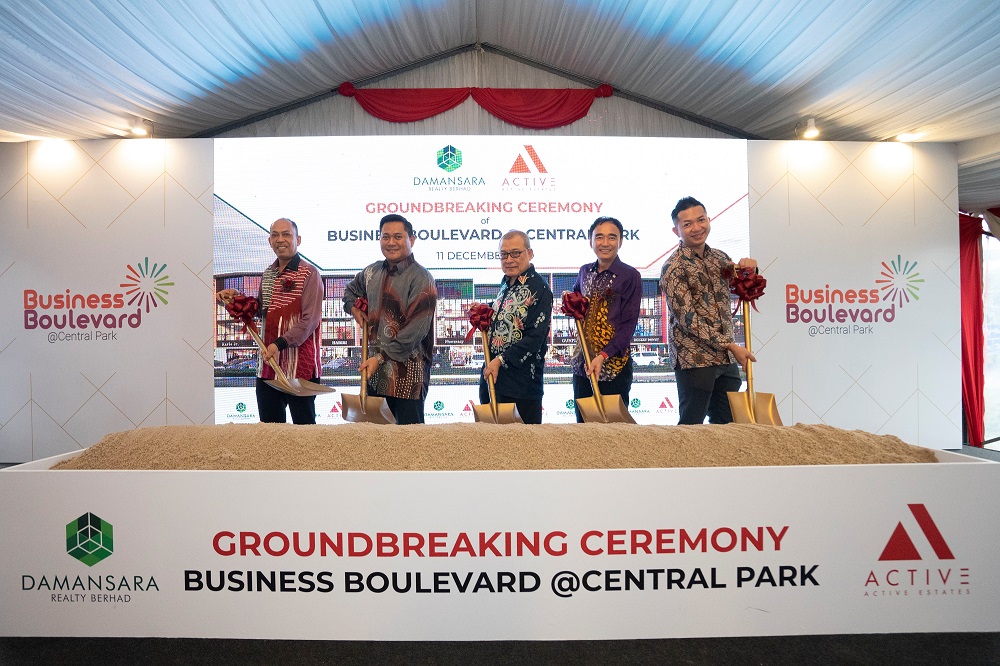
(From left to right) Azhari Abdul Hamid, Group Executive Director of Damansara Realty Berhad; Ts. Brian Iskandar Zulkarim, Group Managing Director of Damansara Realty Berhad; Dato’ Ahmad Zahri Jamil, Chairman of Damansara Realty Berhad; Teo Chee Yow, Group Managing Director of Active Group and Isaac Tan Sze Yen, Deputy General Manager of Active Group.
KUALA LUMPUR, 11 December 2019: Damansara Realty Berhad (DBhd), through its subsidiary, DAC Land Sdn. Bhd, and Johor-based partner, Active Estates Sdn. Bhd. has launched Business Boulevard @ Central Park, set to be its latest commercial development in Tampoi, Johor Bahru.
Business Boulevard @ Central Park, worth an estimated gross development value (GDV) of more than RM150 million, is the third instalment of Aliff Square and will comprise 68 units of freehold commercial shop-office lots to be developed in four phases over the next five years.
This 6.9-acre development will cater to the existing waiting list of interested buyers following the success of DBhd’s Aliff Square 1 & 2 developed in the same area.
“Now that Aliff Square 1 and 2 are fully sold, we’ve proven our ability to design and build properties that meet current trends and buyers’ demands. Leveraging on Taman Damansara Aliff’s strategic location and excellent connectivity, we expect Business Boulevard @ Central Park to build on this success,” said DBhd’s Group Managing Director, Ts. Brian Iskandar Zulkarim.
“Seeing the high demand from our registered list of interested buyers for such units in the area, we are optimistic with the allure of this development to the potential business owners and investors,” said Ts. Brian at the ground-breaking ceremony today.
This strategic alliance is part of DBhd’s expansion strategy. In October 2019, DBhd and its joint venture partner Country Garden launched Phase Three of their joint development project Central Park at Persiaran Aliff Harmoni Utama, Johor Bahru. Phase Three Central Park will spread over 14.7 acres of land, comprising of 216 double-storey terrace units.
Additionally, DBhd’s joint development project with state investment arm, Menteri Besar Negeri Sembilan Incorporation (MBNSI), for a 50-acre commercial land in Sendayan is expected to start sometime in Q1 of 2020.
“Strategic alliances have always been a key enabler to DBhd’s growth and has always been part of our long-term strategy. By combining strength and capabilities with established partners such as Active Estates, we are able to operate more efficiently with minimal capital expenditure, producing better quality earnings and pushing DBhd closer to our 2019 financial goals.” Ts. Brian added.
*Ts. stands for the title of ‘Professional Technologist’ awarded by the Malaysia Board of Technologists (MBOT).
PROTASCO’S NET PROFIT SURGES ALMOST THREE TIMES AS COST OPTIMISATION EXERCISE CONTINUES
PROTASCO’S NET PROFIT SURGES ALMOST THREE TIMES AS COST OPTIMISATION EXERCISE CONTINUES
KAJANG, 27 NOVEMBER 2019: Protasco Berhad saw its nine-month net profit nearly triple to RM13.1 million from RM4.5 million for the year ending 31 December 2019.
The Group’s pre-tax profit for the nine months surged by 71.3 percent to RM27.5 million despite a dip of 8.4 percent in revenue to RM581.4 million. This performance arose from the group’s continuing cost optimization and right sizing exercise, especially in the Construction and Education segment.
“We expect this turnaround to continue gathering momentum and we are confident that we will return to full profitability in this financial year,” said Dato’ Sri Ir Chong Ket Pen, Executive Vice Chairman and Group Managing Director.
The cost optimization exercise, which was initiated in 2018, has continued to drive improved results at the Group.
Meanwhile, Protasco’s Clean Energy business will commence works on its solar plant in Melaka, which is expected to contribute positively to the future earnings and net assets of the Group.
For the third quarter, Protasco’s net profit rose by 24 percent to RM4.5 million from RM3.6 million in the same period last year, while pre-tax profit increased by 18.1 percent to RM9.8 million, on the back of a marginal 3.6 percent dip in revenue to RM226.5 million from RM234.9 million in the same period last year.
Protasco’s construction segment was the main contributor to the Group revenue in the third quarter, posting a 35 percent jump to RM109.3 million, arising from the ongoing Perumahan Penjawat Awam (PPA) Phase 2 project in Putrajaya.
Compared to the second quarter, revenue in the third quarter was higher at RM226.5 million due to an increase in periodic works awarded to the Maintenance segment. Its Education segment also saw improvement in revenue from a higher student intake.
SECRET DUMPING POLLUTES THE ENVIRONMENT AND CREATES A HAZARD TO OUR HEALTH
SECRET DUMPING POLLUTES THE ENVIRONMENT AND CREATES A HAZARD TO OUR HEALTH
The illegal dump in Kampung Tambak Jawa, Selangor, where drums of hazardous chemicals caught fire and exploded on November 25, is an alarming indication of the rising occurrence of secret and illegal disposal of waste. Earlier this month, 250 drums of glycerin were found dumped on the banks of the Klang River.
Illegal dumps, whether of household rubbish or hazard chemicals, are a threat to the environment and to human health, representing a serious leakage from the waste management system, and the source of pollution in the rivers, seas and oceans.
Waste management authorities need to heighten their enforcement of proper disposal of waste, especially hazardous chemicals. The rising number of reports of illegal dumping is of great concern because whether into rivers or on idle land, illegal dumping threatens the environment and, in the long term, our health and safety. It also costs money, in the form of clean-ups or healthcare, or even a drop in the value of property in the vicinity. Ultimately, the bulk of this cost is borne by the public, either as taxpayers or customers.
In order to reduce illegal dumping, the authorities must examine and understand where and why such leakage occurs, and address the gaps in order to create an effective waste management for Malaysia. To do this requires wider collaboration among all parties involved from regulators to business and industry and to consumers and households.
Regulators are not limited to the National Solid Waste Management Department and the Department of Environment, but include local authorities in every state as well as the Department of Irrigation and Drainage.
Illegal dumping is driven by economic incentives and convenience, and the absence of punishment, or ineffective enforcement, as was demonstrated earlier this year with the “sampah plastik” issue. Illegal dumping, like littering, is also a behavioural issue which cannot be addressed through blanket bans. It must be addressed as an infrastructure and system design issue and not just as an enforcement issue.
Addressing and preventing illegal dumping and littering, like the “sampah plastik” issue, will require a problem-solving approach, rather than knee-jerk measures like blanket bans. Careful analysis must be applied to identify the right measure or policy intervention in the design of an effective waste management system, preventing pollution and protecting the environment.
These include economic and social incentives to facilitate and promote behaviour change, and not just physical facilities. We also need a multi-stakeholder collaboration from all parties across the value chain from Government, brand owners, retailers, NGOs and consumers and industry.
Illegal dumping and litter are sources of environmental pollution, be it on land or at sea. MPMA has advocated the proper disposal of rubbish and waste under our “Don’t be a Litterbug” campaigns “Use a Bin” programme since 2012.
We need to continue our education efforts on a proper waste disposal, practising the 3Rs (Reduce, Reuse and Recycle) and more urgently we need to work towards establishing an advanced plastics recycling industry for Malaysia.
Recycling is a core component of an effective waste management system and plays a vital role in protecting the environment. It is the key element of Circular Economy, a system that moves away from the old “take-make-use-throw” progression. In a circular economy, waste becomes a valuable resource, to be recycled as raw material, made into new products and not thrown away. This reduces the need to extract more natural resources and the impact on the environment.
MPMA and MPRA are committed to developing a clean, vibrant and healthy plastics recycling industry that would boost the country’s recycling rate and contribute to a cleaner, greener Malaysia. But we cannot do this alone.
MPMA & MPRA
26 NOVEMBER 2019





